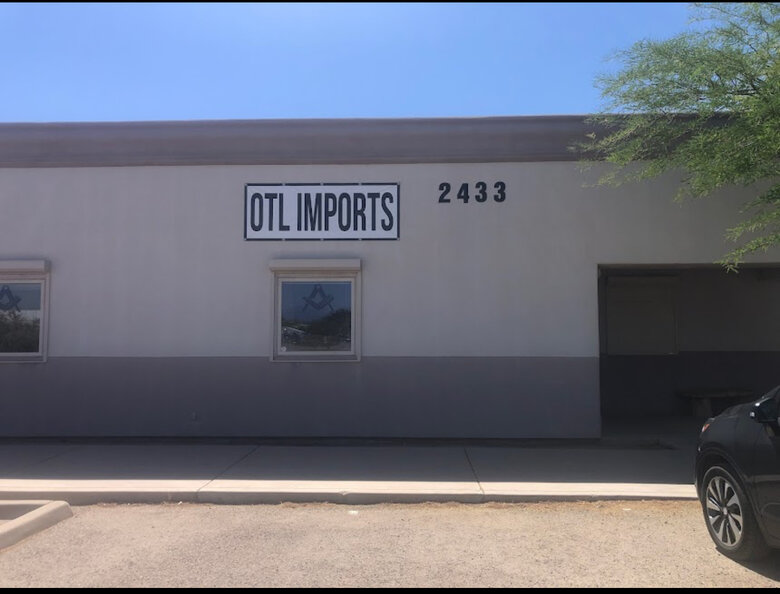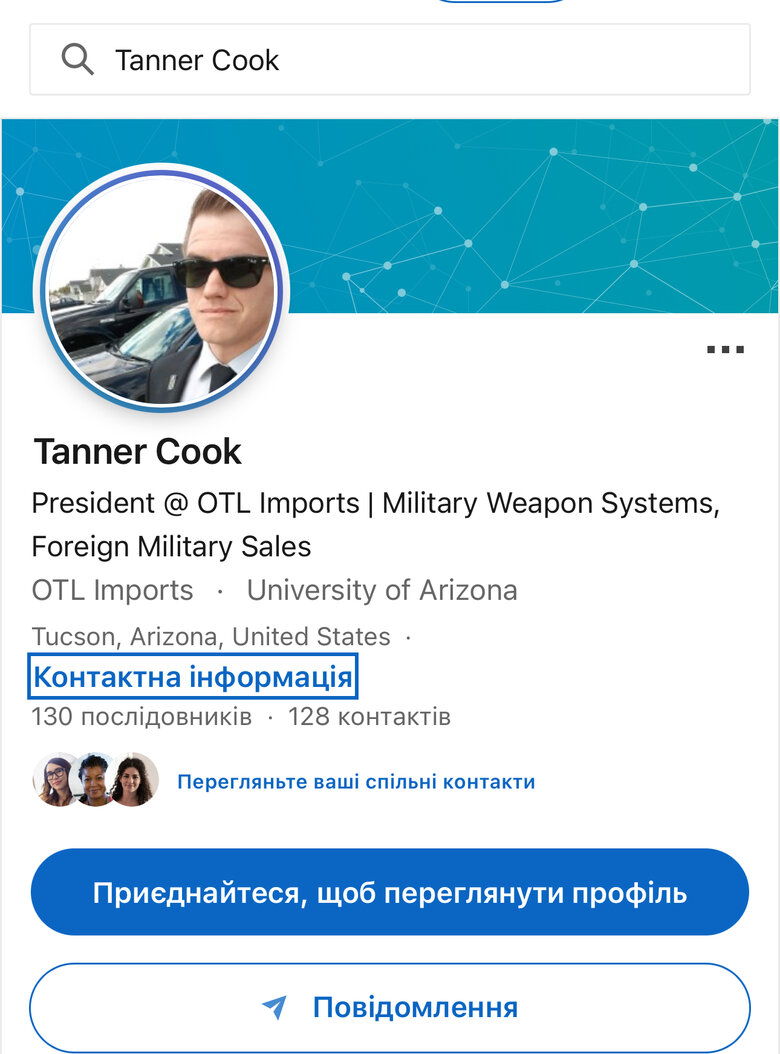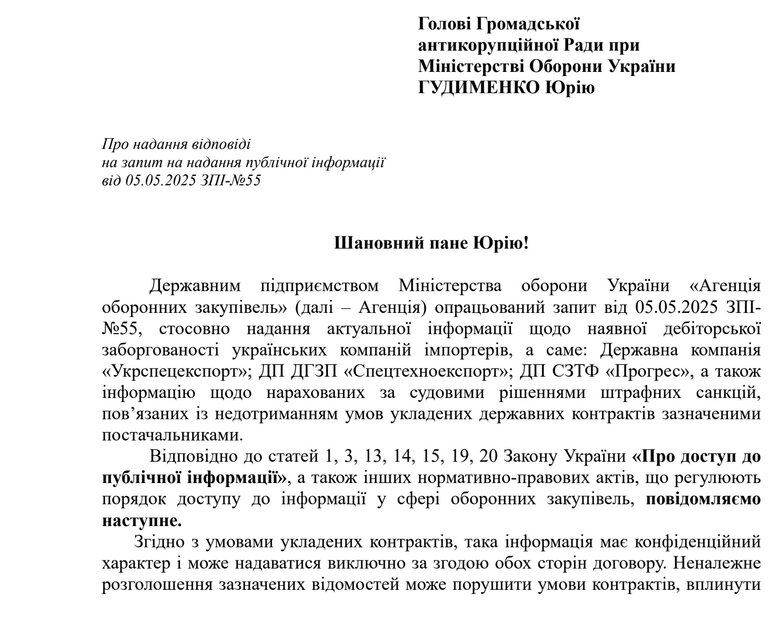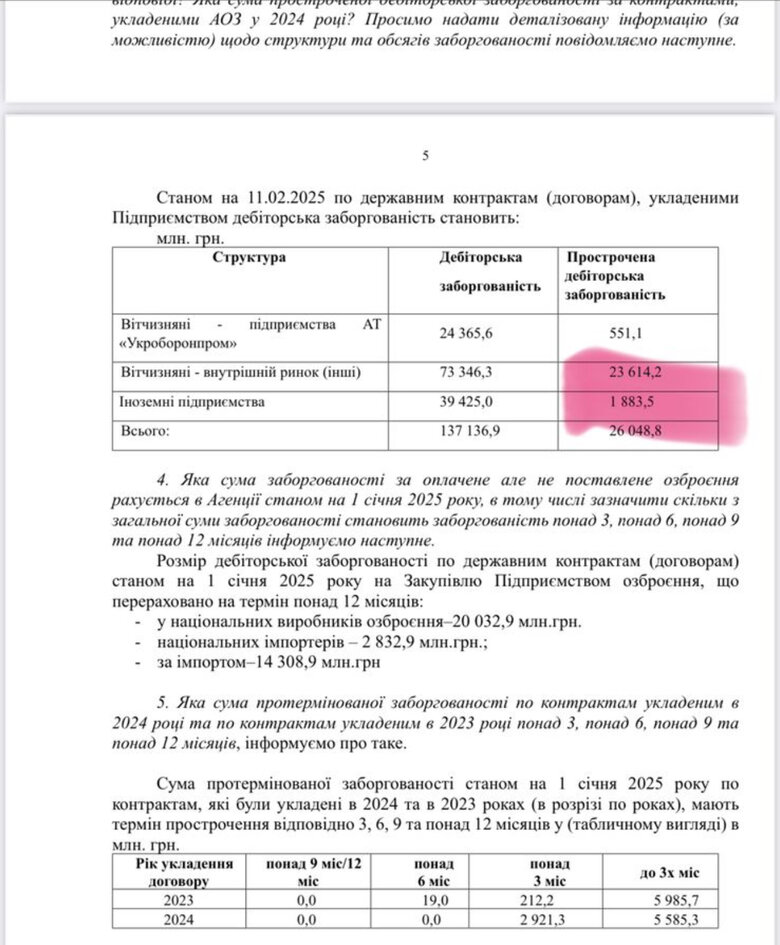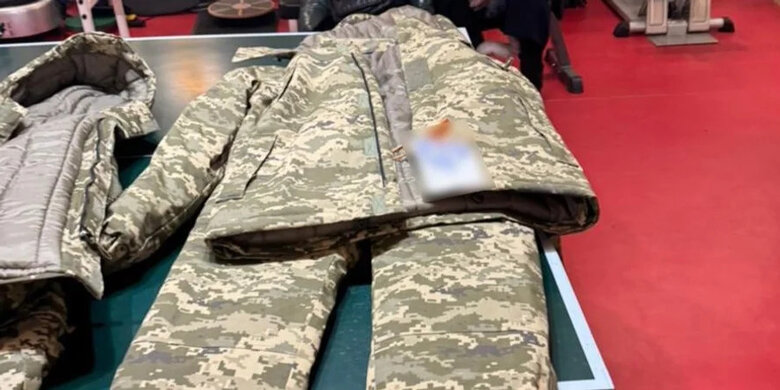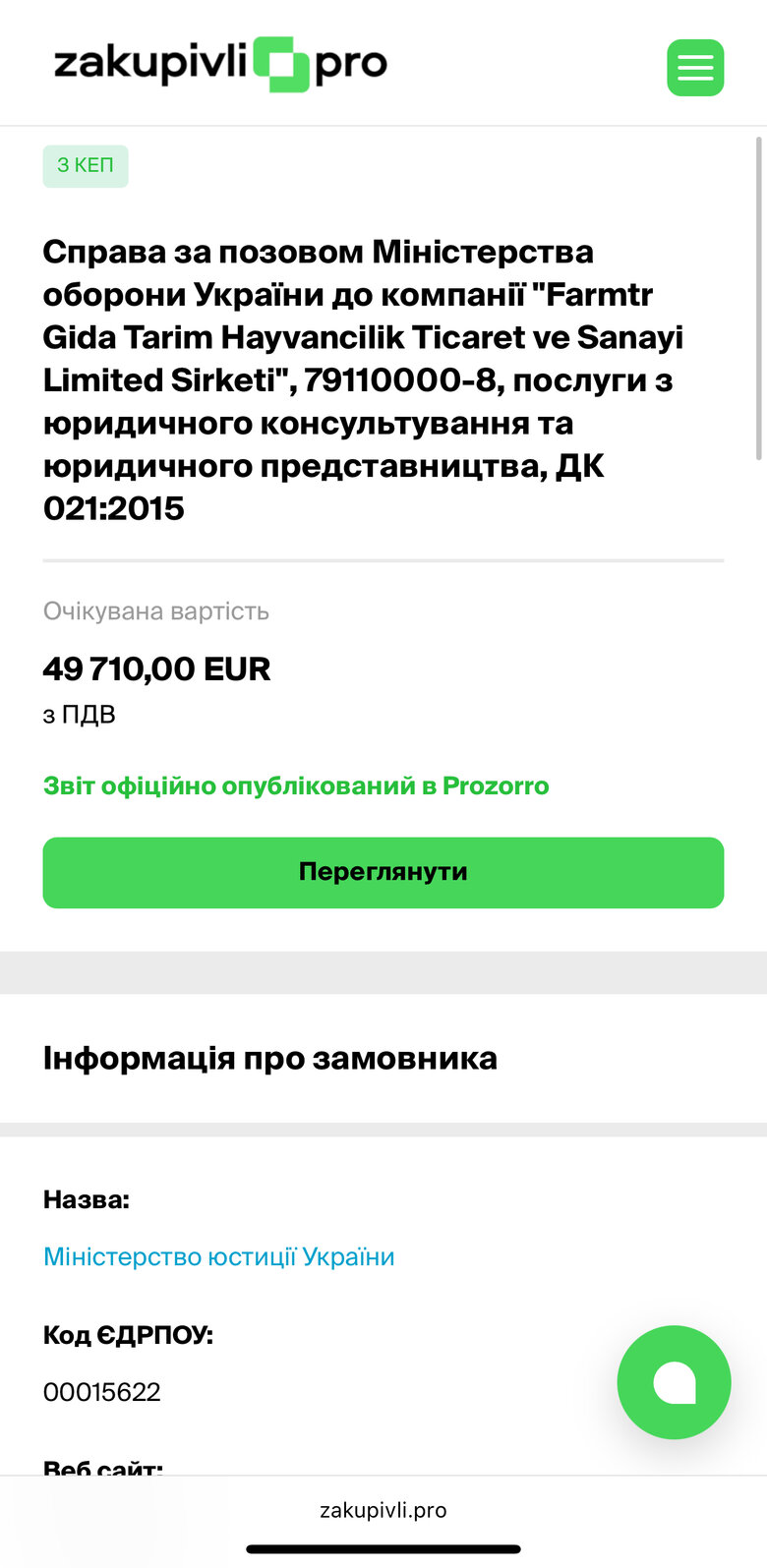Exemplary fraud: 4 stories about how Ukraine had paid for weapons but received nothing or junk
Since the start of Russia’s full-scale invasion, Ukraine has paid about $770 million in advance to foreign suppliers for weapons and ammunition that have never been delivered.
Financial Times published the article last Friday.
The publication managed to unearth one interesting case, but this is a good reason to recall others and see what conclusions the Ukrainian authorities have drawn from them.
Greenhouse effect for a businessman from Arizona
So, in 2020, 28-year-old Tanner Cook, from Arizona, opened a small ammunition store on a dusty road off the highway on the outskirts of Tucson. Cook's small business was located in a one-storey beige concrete commercial building with a temporary sign on the wall: "OTL IMPORTS".
"Cook's first customers were local gun enthusiasts, and one radio host from Tucson gave OTL Imports a tip to help his 'really good buddy' get started. "He sells ammunition, he sells guns, and he has really good prices," he said. "He's a really good guy!" FT writes.
But two years later, Cook received a great order: his tiny ammunition shop signed a €49 million contract to supply weapons to the Ukrainian Ministry of Defence.
OTL received a 35 per cent advance payment of €17.1 million in November 2022. However, Ukraine did not receive any weapons.
But the young local shopkeeper now has a photo on his Facebook page in front of a Black Hawk helicopter, according to the FT. As of Saturday, his account could no longer be found.
Cook's company, which had what looked like a garage among greenhouses, was contracted by the Ukrainian state-owned speciality importer "Progress".
An interlocutor of the publication said that Cook was recommended to them by a businessman with whom the company worked in 2009.
In fact, the state-owned company "Progress" is a cluster of scandalous contracts.
For Censor.NET readers, "Progress" is most likely known as the previous place of work of Oleksii Khoroshaiev, one of the key figures in the scam involving the non-delivery of 100,000 mines called the "Lviv Arsenal".
In the autumn, the Defence Ministry's Military and Technical Policy Department, headed by Oleksandr Liev, inexplicably contracted Yurii Zbitnev's firm at prices much higher than those of competitors, but without any experience.
As a result, Ukraine did not receive the mines. Instead, part of the money was spent on buying the remains of a gunpowder factory in Bosnia, and another part was withdrawn into cash.
The defendants in the case were people who had previously been involved in corruption schemes at the Odesa Port Plant and the United Mining and Chemical Corporation.
And the owner of the Czech office through which the funds were withdrawn committed suicide a year later.
Another scandal related to "Progress" concerns the Polish pad company "Alfa z.o.o.", which in April 2022 directly offered the Ministry of Defence to supply a certain number of shells. Despite the fact that the company had already disrupted the supply of helmets to the Armed Forces at that time, the ministry signed a new agreement with it.
However, about a month later, the Ministry of Defence signed three more contracts for the supply of 122- and 152-calibre shells with the state-owned special importer, "Progress", in which the Polish company "Alfa Sp.z.o.o." was only an intermediary.
The Poles then cancelled their contract, but the price in the new one through "Progress" was significantly higher, with a difference of €95 per unit.
While the Poles initially offered the 122 mm high-explosive incendiary full-charge howitzer shells for D-30 howitzers for €890, they were already in Progress' contract for €985.
Since 2023, the NABU has been working on this case. In April 2024, searches were conducted in this case even in Poland. However, after that, the case was seriously resisted.
A few weeks ago, the Public Anti-Corruption Council at the Ministry of Defence sent a request to the Ministry for information on receivables of key state-owned specialised importers. But in response, they were told that this was classified information.
Meanwhile, the author of this article has a table of overdue receivables as of 6 February 2025, and several contracts with "Progress" are still pending.
In particular, under contract No. 76, there is still a debt of 106.7 million. And under contract No. 289, the debt is still 474 million. Contracts of 2022.
Cook is not the only dubious US supplier that has caused problems for the Ukrainian Ministry of Defence.
If we don't sell them, we'll repair them. How the Americans and Ukrainians pulled off a scheme with Italian howitzers
In the summer of 2022, the MoD simultaneously received two commercial offers from intermediaries of private companies.
First, on 2 June, LAVR International (USA), through the special importer "Spetstechnoexport" (which at the time was still subordinate to the Defence Ministry, not the DIU), offered to supply 123 units of M109 Lema self-propelled howitzers produced in 1991-1998 after repair at a price of USD 2 million per unit, excluding delivery costs.
Five days later, the US-based Ultra Defense Corporation (UDC), through "Ukrspetsexport", made an offer to supply 123 units of M109 Lema self-propelled howitzers, manufactured in 1978-1995, after being refurbished at a lower price of US$1.225 million per unit.
It is unlikely that Italy had 246 howitzers. Rather, it was the usual practice of Ukrainian special importers to be the first to grab a tidbit. And USE and STE were the biggest competitors here.
According to an informed source, Volodymyr Pikuzo wanted to buy the same 155 mm LEMAs as serviceable ones, having signed a state contract on behalf of the Ministry of Defence of Ukraine, while still acting as the Director of the Department of Arms Procurement, dated 04.07.2022, with a total contract value of about UAH 1.2 billion and a unit price of about UAH 37 million.
The procurement did not take place because on 02.09.2022, it became finally known that 33 units of 155 mm M109 Lema self-propelled howitzers would be transferred free of charge, as the importer, SE "Ukrspetsexport", authorised to interact with the Italian side, informed the Ministry of Defence.
However, a week before the transfer, the USE sent a letter to the Ministry of Defence demanding that 33 howitzers be "prevented from being included" in the batch offered by the Italian government for free transfer to the Ukrainian Armed Forces.
In fact, the then leadership of the Defence Ministry's procurement department and "Ukrspetsexport" opposed the scheme of purchasing munitions with state money. Therefore, the funds paid by the Ministry of Defence to "Ukrspetsexport" were returned to the state budget. And, according to arms market participants, it was this decision that eventually led to the dismissal of the then head of USE, Vadym Nozdria, who did not want to support the scheme.
Following the appointment of Volodymyr Pikuzo and his deputy Oleksandr Kovalenko to the Defence Procurement Agency in autumn 2022, UDC received a contract with the Ministry of Defence worth USD 19.8 million. Not for purchase, but for repair.
The cost of repairing one howitzer under the contract is about UAH 32.4 million.
To circumvent the Ministry of Defence's procurement department, which was against it, the funds were allocated through the Logistics Forces Command of the Armed Forces of Ukraine.
The payment was almost one hundred per cent, and therefore the work had to take place within a hundred days. But not only the deliveries did not happen on time, but in the summer the New York Times published an article stating that the repairs were of poor quality and the government contract remained unfulfilled.
Judging by the video available to the publication, smoke was coming out of the engine of one of them, and coolant was leaking from the other.
Only six months later, in January 2023, the first batch of 13 howitzers was delivered to Ukraine.
The curse of Balkan mines and Morales
Another American supplier that should have earned the FT's attention because it still has overdue receivables is Marc Morales' Global Ordnance.
Despite many years of murky biography and numerous corruption scandals, Morales remains an important player in the arms market. Especially if you need to bring something from a warehouse in a third world country.
In June 2022, Morales' company signed a contract with the Ministry of Defence, represented by Oleksandr Liev, for the supply of 77,000 120-calibre mines and 25,000 high-explosive fragmentation shells. The total value of the contract was more than US$60 million. The ammunition was to be brought from the Balkans (the "Lviv Arsenal" was also transporting them from the same place). Deliveries were to take place in August, September, October, November and December 2022.
On 30.06.2022, the company received a 50% prepayment of the contract - USD 30 million or UAH 899.3 million.
In September, the Ministry of Defence, having not received the second round of ammunition, wrote a letter to the US company demanding an explanation. It received a reply that the goods were delayed due to the supplier's unexpected lack of components and the failure of the government to issue an export licence, with the expected delivery date being by the end of December 2022.
In December 2022, the Ministry of Defence received nothing but a letter in which the company explained the lack of supplies by "Russian influence on the highest elected officials of the supplier country (the president and the minister of defence)".
The MoD then offered to terminate the contract and refund the subscription. Instead, Global Ordnance requested an extension of the delivery date to 31 March 2023.
As of mid-2023, according to the SASU report, the US company has not yet been fined as stipulated in the contracts. The money has not yet been returned.
This is not the only problematic contract with Morales' company. There were others.
Two years ago, the American NYT described another dubious scheme of the company.
At the start of the war, the state-owned company "Ukrinmash" agreed a deal with an Egyptian seller for about $65 million to buy nearly 200 vehicles. Then the deal stalled. Shortly thereafter, Morales signed a contract to supply similar vehicles at similar prices. The difference was that Global Ordnance, not the state-owned company, was making the profit.
As you can see, this is the second story when a contract is suspended for some reason and then another company enters the arena (the first one mentioned here was with Alfa). However, sometimes with a similar or higher price offer.
However, this is not the only problem with this contract. According to the NYT, there was another problem with the delivery of Global Ordnance, because, according to Deputy Defence Minister Volodymyr Havrylov, the equipment arrived in an improper condition, which led to an investigation by anti-corruption authorities.
Here is how these shortcomings were described in the SASU audit, part of which is available to the publication: "the deficiencies were not eliminated in full (depending on the car: there is no rear fuel tank cap; the rear view camera does not work; water gets into the vehicle interior during rainfall from the driver's side; the seam of the gunner's hatch is not welded completely (a gap between the turret hatch and the vehicle body is visible); there is no mechanism for manual throttle control on the driver's dashboard, the landing gear door lock is defective (the door does not close tightly); the gearbox lever and the transfer case are not fixed in the vehicle interior, and the passenger hatch lock is not in the open position."
In addition to the companies already mentioned, the list of overdue receivables, and therefore undelivered weapons, includes the US-based Regulus Global, Centcom Global, Global military products, Croatia's WDG promet, Czech AKM Group and MAX Merlin.
More Reznikov jackets
At the same time, the receivable relates not only to the supply of weapons, but also to food and clothing.
For example, last year, the American company Sinclair & Wilde conducted a fairly active PR campaign and even accused the National Police of Ukraine and the Ministry of Defence of corruption and bribery.
According to the company, the Ministry of Defence has not paid it $14 million.
However, according to the documents available to Censor.NET, in the MoD the company has overdue receivables of almost UAH 17 million.
In November 2024, the National Police reported that they had exposed an adviser to the former defence minister and a former MP who "conspired to seize budget funds on ordering more than a million sets of clothing for the Ukrainian military".
According to a hromadske source in law enforcement, the case involves businessman Roman Balykin, former MP Ihor Franchuk and his son Yaroslav.
According to media sources, the intermediary company entered into 5 agreements with the defence department worth more than $35 million, but the Turkish side stated that the supply of uniforms would actually cost $10 million less. Materials confirming this version are contained in the register of court decisions.
The ammunition Cook sold never arrived in Ukraine. The Ukrainian side has since won an arbitration proceeding against OTL in Vienna, but has not yet returned the money paid to the company.
This is not the only such case.
In addition, it should be understood that Ukraine spends additional considerable funds on international courts. In particular, for the courts with the Turkish company FARMTR GIDA TARIM HAYVANCILIK TICARET VE SANAYI LIMITED SIRKETI, which did not supply protective vests.
Last summer, the Ministry of Justice of Ukraine bought the services of a law firm to represent the state in international courts for 43,000 euros in relation to this company alone.
The FT article about Cook once again quotes Minister Reznikov and the heads of departments as saying that they acted in difficult circumstances.
In particular, Reznikov tells the FT that any improper arms contracts were an unfortunate consequence of the urgency to arm Ukrainian soldiers fighting on the front line at the beginning of the war.
"During a war, there is one criterion of efficiency: you bring a lot of weapons to the front and quickly transfer them to the armed forces. I'm not interested in anything else," he says, claiming that the ministry hasn't had time to think about the price difference. "You have guys on the front line who are dying without shells, and you have to put a shell in their hands every day and every night," he says.
"How many contracts have been signed?" he asks, "and how many of them are in the courts?"
In fact, to avoid the problems that led to the formation of part of the receivables, it was enough to check the warehouses of the companies. The second way out of the situation was direct contracting with manufacturers, as well as a clear algorithm for processing proposals from supplier companies. Without leaking information to competitors.
Another way to protect ourselves is through criminal proceedings and convictions against those who caused the loss of budget funds and the failure to supply weapons to the frontline.
Instead, two years have passed since the "Lviv Arsenal" scandal began. More than a year since Oleksandr Liev has been detained. Last year, Oleksii Khoroshaiev was detained in the Czech Republic.
Currently, all the defendants in this case are at large. According to Censor.NET, "Lviv Arsenal" itself submitted a new proposal to the Defence Procurement Agency a month ago.
Tetiana Nikolaienko, Censor.NET

